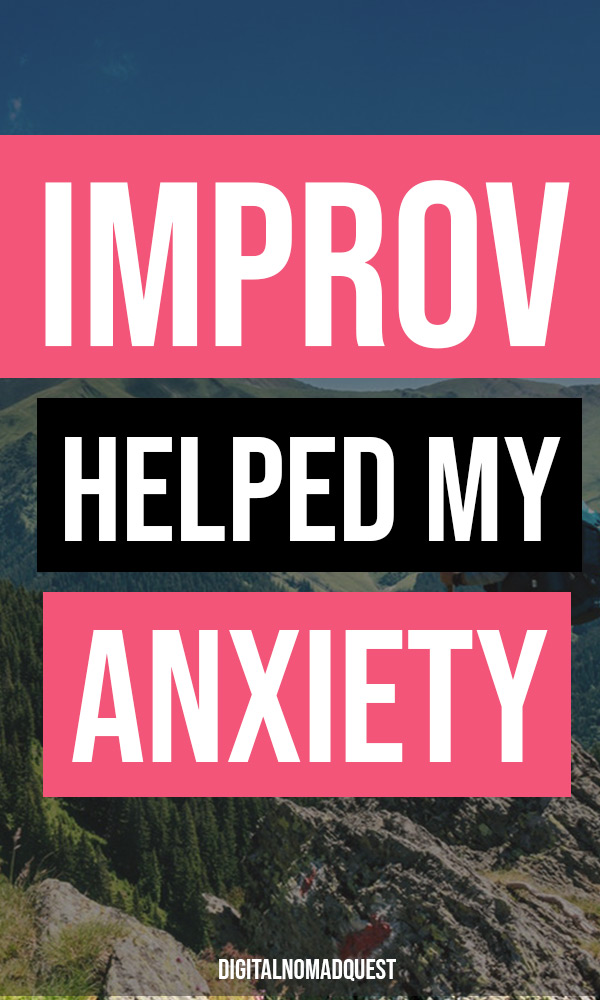In this video, I talk about what I learned from improv. I took improv for about 4 months (both the beginner and intermediate classes), and I really think there are a lot of life lessons you can get out of it. Enjoy!
What I Learned from Improv | Life Lessons from Improv
Below is a transcription of the podcast. This transcription was taken from Otter.ai so it might not be completely accurate:
0:02
0:02
This is the digital nomad quest podcast with Sharon Tseung. teaching people how to build passive income, become financially free and design their best lives. Hey guys, it’s Sharon from digital nomad quests. So I’ve completed eight weeks of beginners improv and now I’ve moved on to intermediate improv class. The reason why I took it was that I was wanting to boost my confidence, my public speaking skills, my on the spot thinking, I’m actually quite introverted. Maybe you can’t tell from these videos, but I get shy I get anxious. I had pretty bad anxiety about a year or two ago. So I’m really doing all these challenges to help me boost my confidence and fight my fears. Basically. Now, I want to tell you guys about my takeaways from improv because the reason why I’m still doing is that I find that I’m gradually improving on little things. So maybe I go to a meeting at work or I have to meet up with Someone one on one who I’ve never met. And those things usually scare me like crazy. But now, I’ve internalized in my head that I’m taking improv, that’s even more scary. This can’t be too bad. The more I do that, the better I am at just like coming at it with a more clear mind and more relaxed sort of mentality. It’s not that I’ve been the fears completely. It’s just that I can see my frameworks and mindset changing. So I think it’s still valuable to stay, doing improv and practicing improv now specifics on what I’ve taken away. Number one, I learned that messing up isn’t too big of a deal and you really shouldn’t beat yourself up about it. In the first class, I messed up and one of the exercises was when you mess up, you just kick out your feet, put your arms together and go, Olga. It’s very stupid, but it made me feel like a lot more loose, made me realize we’re all a team. We’re all in the same boat. We’re not masters here. We’re just trying to improve. So once I realized that a lot of like walls broke down. And I realized who cares, most people are focused on themselves. You think that people are making a big deal about your mistakes, but maybe they’ll think about it, but they’ll forget about it right away while you’re stuck in the negative. A lot of people do well on things that they messed up on. So it’s very important to start learning to let that go and improperly helps you with that mindset change. Another thing I learned was that, you know, when I’m doing these types of exercise, we’re playing and we’re laughing, I become so much more present and not on my phone. I’m not even thinking about it. And I realized, you know, two hours passed by and I haven’t even checked my phone. And I love that feeling. So when you’re laughing, and you’re playing and having fun, you’re really present in the moment. Number three, a thing you constantly hear is the power of Yes. And that’s the theme of improv, right? So when you’re building a scene, you want to bounce off this person’s idea and just go yes. And instead of like, no, but so let me give you an example. Right, so I’m going to say a line. Maybe that can be a starter of an improv scene. Oh my god, Jessica. I just got a tattoo. And I love it. But my mom is going to kill me. So when it comes to a yes and response, you’re basically adding on to what she says you’re not rejecting the idea, you’re going to give a line that supports what she said. So maybe I will say something like, oh girl, that happened to me too. But all you gotta do is put some concealer on it during family time, and you are good. So that’s an example of an improv scene that you just keep going and you add on to each other. It really teaches you about teamwork and communication. So a lot of times people just get along better when you’re kind of going along it and supporting each other having each other’s back. So in this video, Amy Poehler actually describes improv kind of like the military.
3:38
You also said, improvisation is like the military. You leave no man behind.
3:43
You. Remember, the times when you’re in battle and someone abandons you, and you really never forgive them. If you’re in a scene,
3:51
it’s just like pushing you under the truck or is it something else,
3:54
it’s like bailing. It’s like running away as deserving. If you’re in a scene, it’s not going well and you turn to your partner and you look them in their eyes are like, wow, where are we going? You and me like this is crazy, right? And you think I love you forever. And if you turn around, you look at someone and they’re gone. You think, you know, where’d you go? I think
4:13
one of the biggest takeaways for me is actually making choices. So when you’re doing improv, you want to make a choice, you want to stick with it and just go with it. Because if you’re stuck in a limbo, where you don’t know what to choose, you’re over analyzing and trying to figure out the right response. You’re going to be stuck on stage, silent, and it’s just going to be awkward for everyone. It’s better to make a choice. And then everyone just plays off of that, right? So even if it doesn’t hit even if you’re worried that no one’s going to laugh at it, just say something. It’s better than just standing there and saying nothing. And I see this a lot in life where you know, a lot of people don’t make choices. So for example, if people are in bad relationships or relationships, they’re not fully satisfied with a lot of people don’t walk away because they’re To be alone, they’re scared to be without this person. Versus they’re also scared to make the commitment of being this with this person long term, you have to make choices in life in order to, you know, have a fulfilling life because you can’t always be in a limbo, hoping that it’ll all work out, you always kind of have to make a choice and to play off that it also touches upon perfectionism. I kind of mentioned that earlier. And it’s okay to mess up. Because when you’re always trying to be perfect, you’re never going to get things done if I’m trying to make YouTube videos, but I’m always trying to make it 100% perfect, that end up not releasing it, I’m just going to grow at such a slower rate than everyone else. If you’re actually posting consistent content, going to learn from your mistakes, you’re gonna get feedback, you’re going to see it and then you’re going to try to get better with future videos. And that’s how you really grow. So in improv, you don’t have to be perfect. You just do things and you get better. So those are my main takeaways and ultimately, as a whole, it’s really improved my country. Confidence public speaking on the spot thinking I’m still a work in progress, but I can see my mindset shifting. So nice scary situations where I have to make a speech or I have to kind of meet someone new and talk to them. Instead of freaking myself out. I tell myself, hey, I’m good at this. I’m going to get better at this. And improv is really improving my skill set. So there’s nothing to be afraid of. That’s the biggest takeaway. The more you challenge yourself, the better you’re going to get at those things, the more fears you’re going to conquer. So I hope you guys enjoyed this episode. Please make sure to rate review and subscribe. It really helps our podcast grow. And thanks again. I’ll see you guys in the next one.
Transcribed by https://otter.ai


